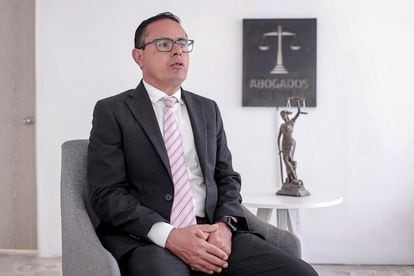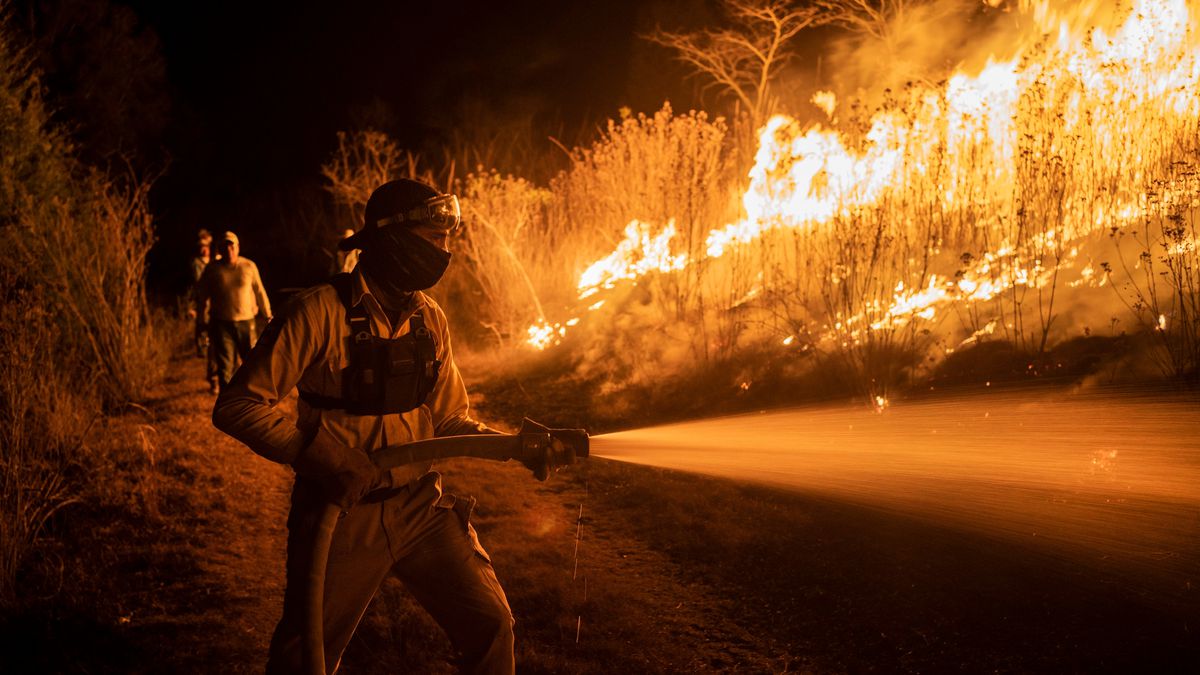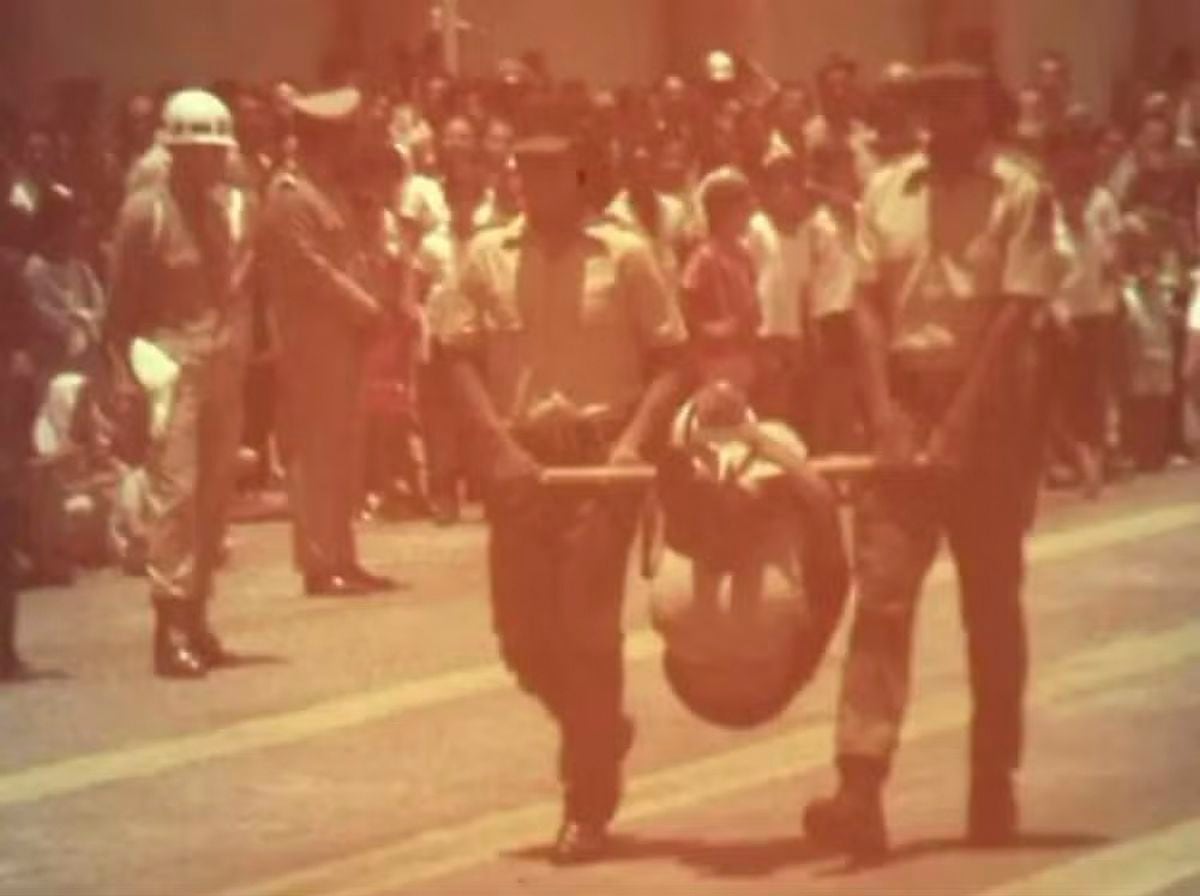Juan didn't want to go to school since February, but his parents didn't know why.
He never talked about
bullying
.
At least not before what happened to him, what they did to him.
Three weeks ago, two classmates from his school sat him on a chair that had been doused with alcohol.
He felt that the desk was wet, but he thought it was water.
When he got up, one of the boys set him on fire with a lighter.
Juan suffered second and third degree burns, is still unable to walk and has had to undergo four surgeries.
The reason for the aggression and teasing: being an Otomi Indian and "not speaking Spanish well."
An attack that could be deadly has forced the Mexican city of Querétaro to have an uncomfortable conversation about discrimination and bullying, in a country where racism is still a taboo and where the vast majority of cases happen off the radar of families. , educational institutions and authorities.
"It was an attempted murder," says Juan Zamorano, father of the 14-year-old.
“Maybe the other children thought the damage would be minor, but my son is going to carry these scars inside for the rest of his life,” he laments.
Zamorano stares at the ground, with a father's anguish.
He has not been able to eat, he has not slept well and every word that comes out of his mouth hides a titanic effort.
He and his wife have had to stop working to focus on taking care of
Juanito
, as they call him in his family.
His body is present, but his head is two kilometers away, in the hospital where his son is being treated.
“We are in
shock
”, he admits.
His son is also in
shock
.
She was unable to speak for several days.
But when she did, he stopped talking about the abuse he had endured.
Her classmates at Josefa Vergara High School cut her hair, made fun of her accent and laughed at her mother, who sold sweets on the street in the afternoon to cover expenses.
Juan, a withdrawn young man with few friends, told his parents that he did not get along with his teacher, that she exhibited him, and that he was not comfortable with the other boys.
He didn't say anything specific about teasing.
The teacher and the director of the school refused to change the room and assured that they did not know anything about why the boy wanted to do it.
The "Jose Vergara" secondary school where Juan Zamorano studies. RODRIGO OROPEZA
After the attack, the parents are convinced that the teacher participated or, at least, instigated the abuse.
The children who set Juan on fire had thrown a can of condensed milk on the classroom floor and asked the teacher for alcohol to clean it.
Fabián García, legal representative of the family, says that two weeks before the incident, a disciplinary report was filed against one of the two children accused of being responsible for bringing alcohol and a lighter to class.
It was not the first time he had done something like this, the lawyer maintains.
"He had a warning note signed by him and by his parents on May 20 of the year in which he promised not to spray his classmates with alcohol again," says Garcia.
The report, as well as other sanctions,
"No one helped him," lamented the boy's father.
After he started burning his pants, Juan undressed and the teacher sent him to change in the bathroom and got him another one.
Always according to the family's story, while Juan was changing, the teacher went out to buy an onion at a nearby store and asked him to spread it on her to relieve the burns.
The boy was bleeding and so he took him to a nearby clinic to see what they could do.
It was not a specialized site, but from that moment they realized the seriousness of the injuries.
The teacher finally took Juan to her house in El Salitre, a community marked by contrasts, where tennis courts and private clubs coexist wall to wall with humble homes and unpaved streets.
“They never contacted us,” says Zamorano,
It was not until the day after the attack that the child was taken to the Children's and Women's Hospital, where he has been admitted ever since.
Juan has burns on his lower back, buttocks, calves and genital area.
"We're not sure he's going to look good," says his father.
The lawyer Fabián García in his office, in the State of Querétaro.
RODRIGO OROPEZA
"The first thing the teacher had to do was call 911 and then notify the parents, according to the protocols," Garcia claims.
After the attack, Juan's parents, the families of the other children, and the teacher met.
The teacher said that the parents of the aggressor boys promised to assume the medical expenses in exchange for the matter being resolved discreetly.
"Don't file a lawsuit because if you do, they don't count on us, we're not going to help you," the father recalls what the teacher told him.
"We did not agree."
The law firm that advises the family has filed three lawsuits: one against the boys who assaulted him and two against the teacher.
The teacher is reported to the Public Servants Prosecutor's Office, where she claims compensation for property damage as she is a representative of the State.
An investigation was also initiated in the Internal Control Body of the educational authority, which determined the indefinite suspension of the teacher, according to a statement published on Friday.
The teenagers have been prosecuted for the crime of intentional injuries, but they are only 13 years old and are not subject to any criminal punishment: they are too young even for a juvenile center.
“Definitely, it is an unfortunate fact, this should not have happened”, recognizes the state secretary of Education, Martha Elena Soto.
The official is reluctant, however, to qualify what happened as
bullying
or racism and avoids commenting on the teacher's actions, given that the internal investigation of the educational authorities was underway at the time of the interview.
Soto blames the incident on the "twitching" caused by the pandemic.
"This fact may be a consequence of the confinement we had," she defends.
The secretary assures that the Querétaro authorities have offered to cover medical expenses, provide psychological support and financial support through various dependencies.
View of the Attorney General of the State of Querétaro. RODRIGO OROPEZA
Zamorano says, instead, that they have not been supported.
His family arrived in the state capital 15 years ago from Amealco, the city of Querétaro with the largest Otomi presence, the fifth largest indigenous group in Mexico.
"We came to look for a livelihood, but we are discriminated against a lot, just because of our language," says Juan's father, who until last month worked in construction.
It is not the first physical aggression due to discrimination that they suffer.
In another incident, one of Juan's older brothers was beaten by other boys when he was a child and the beating left one hand permanently damaged, Zamorano says.
His sisters have also received insults because of their origin: "Look at your parents, they don't even have enough to eat."
"But they put up with it, they haven't told us anything until now that this happened to us," he says resignedly.
“People get annoyed by our speech and they ask me if I am Indian, I tell them yes, I am Indian, native and Mexican,” says Alberto Martínez, a 71-year-old Otomi man.
“When I was a teenager, they called me a filthy, lousy Indian or they grabbed our products with the tips of their fingers, as if we were going to infect them with something,” says Aida Martínez, a 37-year-old saleswoman from Mazahua, who migrated from the State of Mexico to Querétaro to seek economic opportunities.
They also call us
Marías
, as if we were all called that”, she complains.
India María is a widely popular comedy character in the country, which reproduces stereotypes about indigenous Mexican women.
Ella is also a common name for dolls sold by Otomi artisans, which have been recognized as cultural heritage, and has been adopted as a derogatory nickname for female handicraft vendors, regardless of their ethnicity.
“Racism is very evident here in Querétaro and everywhere, ask anyone here about the doll vendors and they will tell you about the
Marías
,” says Luz del Carmen Díaz, an Education student at 21 years old, originally from Amealco.
“As a teacher I come into conflict, because they only teach us to stand up and teach, but they don't prepare us to tackle such a subject,” she claims.
Soto does not agree and assures that there is indeed a preparation for teachers, that it is a matter of “reinforcing” the mechanisms and that Querétaro is above the country average in the reference indicators.
This newspaper sought an interview with the governor, Mauricio Kuri, who declined for agenda reasons.
The attack against Juan put Querétaro in front of the mirror of racism, although for a short time.
“It was very sad to know what happened, but I think it was even sadder that many people didn't find out,” says Arantza Cuanalo, a 20-year-old student.
"The news caused a lot of noise but it was a one day thing, the next day it was over," she says.
"I have not suffered discrimination, but I think it is due to my social class and my skin color."
Physical appearance is the main reason for discrimination in Mexico, according to the latest national survey on the matter.
Colonia El Salitre, where Juan Zamorano's family lives. RODRIGO OROPEZA
In García's opinion, in Mexico it is very difficult to punish acts of racism.
"We are not prepared nor do we have the laws or the culture to do it," he says.
Josefa Vergara High School has interrupted face-to-face classes while what happened is clarified and, after an initial effervescence, silence now predominates in the school community.
For now, a judge has prohibited the two young aggressors from approaching Juan, from leaving the State and has ordered that they remain under the guardianship of his parents.
The process against the boys, who have been expelled from high school, is expected to continue at the end of August, while the investigations are unburdened.
"He has asked me if there is going to be any justice," says Juan's father, before stating that they will look for a new school.
"I encourage him and say yes."
subscribe here
to the
newsletter
of EL PAÍS México and receive all the informative keys of the current affairs of this country






/cloudfront-eu-central-1.images.arcpublishing.com/prisa/XWDEWCZPBVCCDFB3VJU2TWK5PY.jpg)


